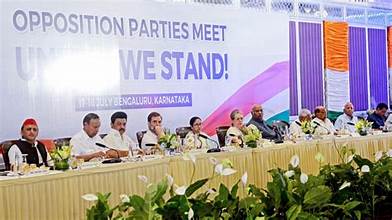In the intricate tapestry of Indian politics, alliances form and reform, often shaping the future of the nation’s governance. A recent development has brought to light the evolving dynamics within the political landscape, particularly concerning the Bharatiya Janata Party (BJP) and Janata Dal (United) [JD(U)]. Reports, based on sources, indicate a significant shift as Nitish Kumar, a pivotal figure in Indian politics, edges closer to formalizing his alliance with the National Democratic Alliance (NDA).
The Seat-Sharing Agreement: A Strategic Move for the General Elections
At the heart of this political maneuvering is the seat-sharing agreement between the BJP and JD(U) for the upcoming general elections. This agreement marks a crucial stage in their collaboration, setting the stage for a united front in the elections. The intricacies of this alliance reflect a larger pattern of strategic partnerships within Indian politics, where seat-sharing often serves as a barometer for the strength and stability of political alliances.
The Art of Political Bargaining: A Closer Look at the Negotiation Dynamics
The political landscape is rife with negotiations and bargaining, as evidenced by the recent statements from Union Minister Giriraj Singh. He pointed out the ongoing “6-5 game,” a metaphor for the intricate negotiations and hard bargaining tactics employed by political parties. This game of political chess is not new; it has been a consistent feature since the formation of these alliances.
A notable instance in this complex interplay was when a minister from Nitish Kumar’s party swiftly countered a statement by the Rashtriya Janata Dal (RJD), which credited Lalu Prasad Yadav for Kumar’s position as Chief Minister. This quick exchange of statements is a classic example of the rapid strategic responses that characterize Indian political discourse.
The Role of Symbolism and Rhetoric in Political Narratives
In a move laden with symbolism, Nitish Kumar’s political narrative was further colored by his reference to a popular song, “मैं मायके चली जाऊंगी,” which he used to metaphorically express his position in the political scenario. This reference, highlighted by Giriraj Singh, underscores how political figures often use cultural references to resonate with the public and convey deeper political messages.
The Influence of Family Politics and Ideological Struggles
The dynamics between Nitish Kumar and the RJD, particularly with Lalu Prasad Yadav and his family, illustrate the ongoing interplay between individual political figures and broader ideological battles. The strategic moves, including Kumar’s criticism of family politics and his invocation of Karpoori Thakur, a respected socialist leader, highlight the ideological struggles within Indian politics. These maneuvers are not just about gaining immediate political advantage but also about aligning with or challenging deeply rooted political ideologies.
The Future of Indian Politics: A Landscape of Unpredictable Alliances
As Indian politics continues to evolve, the formation and reformation of alliances like that of the BJP and JD(U) indicate a landscape where predictability is a rarity. These developments not only have immediate implications for elections and governance but also signify deeper shifts in political ideologies and power structures.
Disclaimer : इस न्यूज़ पोर्टल को बेहतर बनाने में सहायता करें और किसी खबर या अंश मे कोई गलती हो या सूचना / तथ्य में कोई कमी हो अथवा कोई कॉपीराइट आपत्ति हो तो वह [email protected] पर सूचित करें। साथ ही साथ पूरी जानकारी तथ्य के साथ दें। जिससे आलेख को सही किया जा सके या हटाया जा सके ।















